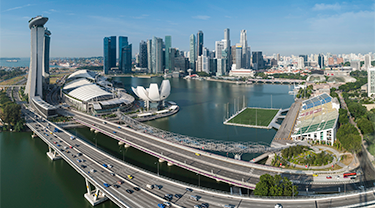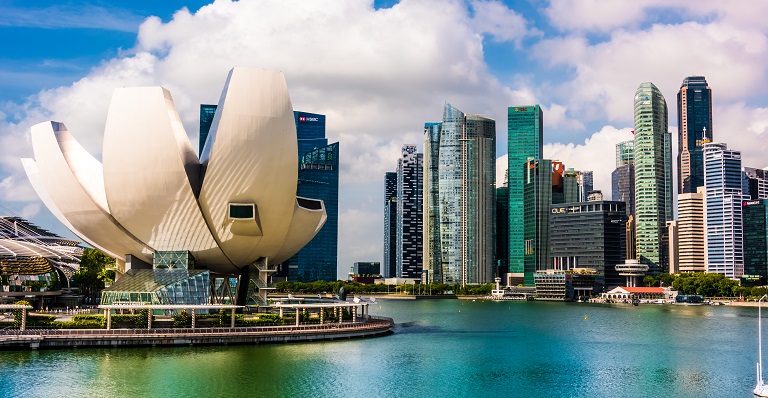
Singapore: Business FAQs and exporting tips
Author details
Susan Redding
Senior international trade writer
With its affluent population and open, diversified economy, Singapore is a promising market for Canadian exporters. While small, Singapore offers deep connections to other countries in the region, which is why many companies use it as a launchpad into Asia and the Indo-Pacific.
The island nation is ideal as a base of operations, as it rolls out the welcome mat to international business. Its pro-business policies include robust intellectual property protections, transparent legal and institutional frameworks, and a civil service that’s highly efficient.
Singapore leads the world in transportation and logistics infrastructure, and it offers easy connections into the rest of Asia by sea and air. The city is also a safe, green and vibrant hub of innovation.
For these reasons and more, Export Development Canada (EDC) chose Singapore as the location for our first standalone branch office back in 2017. Since then, the EDC Singapore office has served as a gateway to Southeast Asia and the broader Indo-Pacific region for Canadian exporters. We use our proximity to Asian buyers to identify new opportunities for Canadian businesses, connect with local partners, provide underwriting and financing solutions to facilitate trade, and act as a catalyst to increase Canadian business in the region.
We believe there’s room to grow Canadian trade with Singapore, and our in-market team is ready to put their knowledge and network to work for Canadian exporters and investors. To help you start planning your market entry, here are the EDC Singapore team’s answers to frequently asked questions (FAQs) about the dynamic island nation.

FAQs about doing business in Singapore
The EDC Singapore office is located at:
12 Marina Boulevard #34-04
Marina Bay Financial Centre, Tower 3
Singapore 018982,
UEN: T16FC0096K
EDC’s office in Singapore is a standalone financing branch that conducts regional underwriting, business development, and in-house legal and administrative operations. Our Singapore team is also a supply-chain talent scout for our partners in the Indo-Pacific. Through our Business Connections Program, we promote Canadian capabilities to international buyers and introduce them to Canadian companies that can add value to their supply chains. We also offer financing to international companies working with Canadian suppliers.
Yes. Singapore and Canada are both part of the Comprehensive and Progressive Agreement for Trans-Pacific Partnership (CPTPP), along with eight other countries in Asia-Pacific. Once fully implemented, CPTPP will open markets for Canadian exporters and investors in Singapore by:
- removing import duties on most Canadian goods entering Singapore;
- improving access for professional service providers; and
- making it easier for business visitors and investors to temporarily work in Singapore.
The agreement will also create new procurement opportunities for Canadian companies in Singapore by making it possible to bid on government contracts.
As a small island nation, Singapore relies heavily on imports. Canadian companies across a range of sectors can find opportunities in Singapore, which offers a stable economy, wealthy consumer base, first-class business environment and a culture of innovation.
Canada exports approximately $1.5 billion in merchandise to Singapore annually. The top Canadian export products include:
- Transportation equipment and parts
- Agricultural products and seafood
- Electronic equipment
- Metals and minerals
Yes, English is widely spoken in Singapore. Singapore has four official languages: Malay, Tamil, Singaporean Mandarin, and English. Malay is the national language, but English is the language of business, government and education.
Singapore is compact, with good public transportation connections and taxi services throughout the city. But most business travellers prefer to stay in the Central Business District (CBD). This is Singapore’s financial and business hub, where most international companies, including EDC, have their offices. Hotels in the CBD cater to business travellers, and excellent restaurants, services and amenities are available in the area.
Singapore is an international hub that follows Western dress standards, including “casual Friday” in many offices. But for most meetings and conferences, business attire is expected.
When planning your wardrobe, remember that Singapore’s equatorial climate means it’s hot and humid year-round. Investing in lightweight business clothes and minimizing the amount of time you’re outdoors before meetings can help you stay comfortable. And, don’t forget your umbrella, especially during Singapore’s monsoon seasons (December-early March and June-September), when it can rain heavily—and suddenly.
While they may vary by industry, business meetings in Singapore have common characteristics. Understanding the local business etiquette and being prepared can help your meetings go smoothly and increase your chances of success in Singapore. Here are a few best practices:
- Meetings tend to be quite formal and must be arranged in advance. Don’t arrive in Singapore and expect to be able to set up meetings quickly or easily.
- Punctuality is expected, so plan your transportation and arrival carefully.
- Introductions include a handshake and exchange of business cards. Present your card with both hands and take a moment to study the cards you receive during introductions—don’t just shove them in your pocket.
- Seniority is respected in Singapore and meeting participants usually defer to people in higher positions of authority. You should greet your counterparts in order of seniority, introduce your own party in order of seniority, and allow the most senior members of the meeting to speak first and lead the discussion.
- “Saving face” is important in Asian cultures, including Singapore. While the concept of face has many nuances, generally, you should respect that your counterparts in Singapore value the appearance of harmony. You can keep relationships smooth even when there are serious disagreements by being polite, showing humility and always staying calm.
Yes. Business luncheons and dinners are popular in Singapore. Meeting over a meal will provide you with a great opportunity to enjoy Singapore’s famous cuisine, which is varied and multicultural, like Singapore itself. If you’re in charge of arranging food for a meeting, be sure to ask if your counterparts have any dietary preferences or requirements (Halal, vegetarian, etc.).
Be prepared to say yes if you’re invited for an informal dinner or drinks after business hours. Declining such offers of hospitality can offend your hosts and may harm your business relationship.
Just like in Canada, video calls and virtual meetings have gained acceptance in Singapore, especially since the COVID-19 pandemic. But relationships are central to business dealings, and you should be prepared to make several trips to Singapore to meet with your counterparts before switching to less formal means of communication. At the very least, your first meeting should be in person.
Once your business relationship is on firm footing, you can likely switch to video conferencing or phone calls to discuss ongoing business. Remember that Singapore is 12 hours ahead of Eastern Standard Time, so calls must be scheduled in the early morning or late evening to accommodate the time difference.
While Singapore is known for being friendly to foreign businesses, exporters and investors may face a few challenges in Singapore, including:
1. Cost: With its strong currency, wealthy population, world-class facilities, and limited land supply, Singapore is a high-cost location. Commercial rents and salaries for local employees are significantly higher than in neighbouring countries. Despite that, Singapore remains a favoured destination for international corporations that recognize the value in operating there despite the higher cost.
2. Competition: Prospective exporters to Singapore must be ready to compete for buyers against the world’s top companies and sophisticated regional players. Prices are competitive, negotiations can be tough, and buyers expect both a good price and excellent after-sales support.
3. Staffing: Singapore’s professional workforce is top quality, but demand for labour exceeds supply, and competition for qualified local employees can be fierce. It’s difficult for non-nationals to obtain work permits in Singapore, making it hard to fill roles in a timely manner.
4. Distance: Visiting Singapore from Canada is time-consuming and expensive. The time difference can make it difficult to schedule business calls. Establishing your presence in-market, either through a branch office or a local representative, can help you overcome this barrier.
Have more questions about doing business internationally? Sign up for EDC’s Export Help Hub.
Quick tips for importing into Singapore
1. Understand the market: A “one-size-fits-all” approach doesn’t work in international trade. Each market has its own rules, regulations and ways of doing business, and Singapore is no exception. Do your research to understand the demand for your product or service, and the competition you’ll face in Singapore. Signing up for a free MyEDC account is a good first step.
2. Get to know the regulations: While maintaining an open economy, Singapore has strict regulations on imports of certain products such as food and medical devices. Be sure to research all regulations applicable to your products and ensure you comply.
3. Use the CPTPP to get ahead of the competition: Canada and Singapore are members of the CPTPP, which gives Canadian companies preferential access to this market and makes trade rules clear and predictable. Review the agreement to learn more about how it can accelerate your company’s growth in Singapore and the Indo-Pacific.
4. Partner with a local company: Partnering with a local company can help you navigate the complex business landscape in Singapore and establish a strong presence in the market. EDC’s Business Connections Program and Canada’s Trade Commissioner Service (TCS) are good resources to help create connections in Singapore and break into supply chains.
5. Leverage government initiatives: The Singaporean government offers various initiatives and grants to support business growth and expansion.
6. Think long term: Foreign buyers aren’t often interested in one-off contracts, so investing in long-term relationships is crucial. If Singapore is right for your company, an on-the-ground presence will help build relationships with local companies. This could be as simple as a sales office, but being close to your supply chain buyers and being part of the business community are very important in many Asian markets, including Singapore.
Learn more about doing business in Singapore.
How EDC supports Canadian exporters
If you’re interested in expanding to Singapore, Southeast Asia, and the Indo-Pacific, you don’t have to go it alone. Our knowledge services are here to help you understand the opportunities, and EDC Credit Insurance makes exporting less risky by protecting you against the risk of non-payment. When you have EDC export credit insurance protection, your financial institution will typically lend against your insured invoices for 90% of their value, significantly increasing your access to cash.
EDC is part of the Government of Canada’s trade ecosystem of experts available to help you save time, learn more about your target markets and identify the capital you need to grow. This network includes Canada’s Trade Commissioner Service (TCS) and the solution-oriented departments and Crown corporations that can solve export problems and offer new perspectives, so businesses, like yours, can confidently expand and succeed, at home and abroad.
Want to learn more?
Answer a few questions about your company to connect with EDC and experience the export impact.
You should also check out
Read this Export Development Canada overview on etiquette style in this key market
















